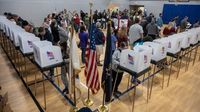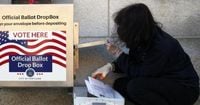In a development that has sent shockwaves through Maine's political landscape, law enforcement authorities are investigating how hundreds of 2025 state election ballots ended up at a private residence in Newburgh, Maine. The incident, first reported on October 1, 2025, by the conservative outlet Maine Wire, has ignited fierce debate over election security just weeks before the state votes on a pivotal referendum to require voter identification.
The story began when an unnamed woman in Penobscot County received an unexpected Amazon package at her home. According to Maine Wire, the box contained not only a bag of rice, paper plates, and a toy lightsaber, but also 250 state election ballots, each sealed in packages of 50. Photos published by the outlet showed a cardboard box with a shipping label bearing the woman's name and stacks of ballots wrapped in plastic. The woman promptly turned the ballots over to the Newburgh town office on the evening of September 30, 2025, as confirmed by Bangor Daily News and Portland Press Herald.
The discovery immediately raised alarm bells among both election officials and political leaders. "We are aware of the serious allegations that packages of ballots were received by a private citizen. Law enforcement is investigating the matter," stated Jana Spaulding, spokesperson for the Maine Department of the Secretary of State, in an email to reporters. However, confusion swirled as neither the Maine State Police nor the Penobscot County Sheriff’s Office claimed responsibility for the investigation, and the Maine Attorney General’s Office declined to confirm or deny its involvement.
Early examination by election officials determined that the ballots appeared legal and were properly sealed, but the fact that they had been shipped outside the secure chain-of-custody protocol mandated by state law prompted urgent questions. Under Maine law, as cited by Maine Wire, "the Secretary of State’s Office designs, approves, and oversees distribution of ballots. Ballots must be printed on secure paper, shipped in sealed units, and delivered directly to municipal offices under strict chain-of-custody rules." The ballots in question, however, had arrived in a box that appeared to have been resealed, according to the recipient and published photographs.
Political reactions were swift and pointed. Maine House Republican leaders issued a statement on October 1, 2025, arguing that the incident revealed vulnerabilities in the state’s election system and underscored the need for the voter ID referendum set for November 4, 2025. Republican gubernatorial candidate Ben Midgley called for a criminal investigation, declaring, "This ballot scandal demands a full criminal investigation, immediately. We need to know exactly what Shenna Bellows was saying in her texts and phone calls, who the Amazon driver was, and how ballots ended up in an Amazon box with no clear chain of custody. This is not the first scandal to occur under Shenna Bellows, as she spent taxpayer dollars trying to keep President Trump off the Maine ballot just a few months ago. Mainers deserve the truth, and they deserve it now."
Jim Deyermond, chairman of the Maine Republican Party, echoed these calls, demanding that the U.S. Department of Justice "assume jurisdiction over this matter immediately." For many Republicans, the incident represents what they describe as a "total collapse of ballot chain-of-custody," in the words of Alex Titcomb, campaign manager for Voter ID for ME. Titcomb insisted, "This latest debacle proves beyond a doubt why Maine needs Voter ID. Without it, our elections remain wide open to abuse and fraud."
On the other side of the debate, those opposing the voter ID referendum urged caution and thorough investigation, but argued the incident was unrelated to the proposed law. David Farmer, campaign manager for No on 1, stated, "There is no tie here. There is nothing on the ballot that addresses this issue, which is already clearly illegal if the allegations prove to be true." Farmer called for a "thorough investigation" but maintained that the problem was separate from the voter ID question.
The timing of the incident has only heightened tensions, coming just a month before Mainers vote on whether to join 36 other states in requiring some form of identification at the polls. The referendum, known as Question 1, has become a flashpoint in the state’s ongoing debate over election integrity and access. According to reporting from Breitbart, Maine Democrats have privately acknowledged that voter ID could cost them as many as 13,000 votes statewide—a figure cited by Democratic Party Chairman Charlie Dingman in a text message to supporters earlier this year. The stakes for both parties are considerable.
Adding to the controversy is the role of Maine Secretary of State Shenna Bellows, a Democrat who is both overseeing the 2025 election and running for her party's gubernatorial nomination in 2026. Bellows has faced criticism from conservatives for her handling of previous election disputes, including an unsuccessful attempt to keep former President Donald Trump off the 2024 Maine ballot. Critics argue that her dual role as election overseer and candidate presents a conflict of interest, and some have called for her resignation in light of the Newburgh incident.
Despite the uproar, many questions remain unanswered. Neither the town manager and clerk for Newburgh, Katie Flores, nor the woman who received the ballots have commented publicly. The identity of the law enforcement agency leading the investigation is still unclear, and the Maine Attorney General’s Office has maintained its silence on the matter. Meanwhile, the state’s Democratic leadership has not responded directly to the allegations, and Secretary Bellows’ office has limited its statements to confirming the investigation’s existence.
Republican leaders have seized on the incident to bolster their case for stricter voting regulations, while Democrats and their allies insist that the existing laws already prohibit such errors and that the referendum would not directly address the kind of mistake that appears to have occurred. The debate has spilled over into the broader national conversation about election security, with Maine’s experience now serving as a high-profile example cited by advocates on both sides.
As the investigation continues, Mainers are left to wonder how such a lapse could have happened and what, if any, systemic vulnerabilities it might reveal. The incident has become a rallying cry for those seeking tighter controls on voting, but also a cautionary tale about the dangers of politicizing election administration. While the facts of the case are still emerging, one thing is clear: with the November referendum looming, the eyes of the state—and perhaps the nation—are now firmly fixed on Maine’s ballot box.
With so much at stake and so many unanswered questions, the story of the ballots in the Amazon box is far from over. The outcome of the investigation—and the referendum itself—could shape Maine’s election laws for years to come.



